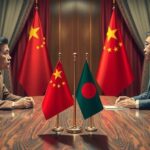Politics
ASIA, BANGLADESH, BEIJING, BEIJING CAPITAL INTERNATIONAL, BEIJING CAPITAL INTERNATIONAL AIRPORT, BILATERAL COOPERATION, CHINA, CO, DHAKA, ECONOMIC ADVISORY COUNCIL, ECONOMIC COOPERATION, ECONOMIC DEVELOPMENT, INDIA, INDIAN OCEAN, INFRASTRUCTURE DEVELOPMENT, INFRASTRUCTURE PROJECTS, MEXICO, MINISTRY OF FOREIGN AFFAIRS, MUHAMMAD YUNUS, NARENDRA MODI, NORTH AMERICA, PEKING UNIVERSITY, SAN, SEVEN SISTERS, TRADE, YUN, YUNUS
Nia Simpson
Yunus Advocates for Bangladesh as China’s Gateway to Economic Expansion
Muhammad Yunus, the chief adviser of Bangladesh’s interim government, recently visited China to propose enhanced economic ties, noting that India’s seven northeastern states are landlocked. He presented Bangladesh as a key player for Chinese investments in the region, emphasizing opportunities in various sectors, including infrastructure and healthcare. Yunus’s discussions with Chinese leaders resulted in nine bilateral agreements aimed at strengthening cooperation.
During a recent four-day visit to China, Bangladesh’s interim government chief adviser, Muhammad Yunus, advocated for enhanced economic ties between Bangladesh and China. Yunus pointed out that India’s seven northeastern states are landlocked, positioning Bangladesh as a potential key economic partner and the “sole guardian of the ocean”. He expressed the possibility for Chinese investment in the region to bolster economic growth and infrastructure development.
Yunus highlighted the strategic advantage Bangladesh holds, noting, “The seven states of India, known as the Seven Sisters, are landlocked. They have no way to reach the ocean.” He suggested that deeper Chinese engagement in Bangladesh could facilitate extensive economic opportunities through production and export activities. Sanjeev Sanyal, a member of Indian Prime Minister Modi’s economic advisory council, questioned Yunus’s rationale for emphasizing the landlocked status of the Indian states.
Reflecting on the longstanding relationship between Bangladesh and China, Yunus stated that strong collaboration has significantly aided both nations over the years. He expressed hopes that Bangladesh could view China as a close ally, especially as Yunus seeks to revitalize Bangladesh’s economy in light of recent political challenges. Yunus was also honored with an honorary doctorate from Peking University during his visit, signaling the diplomatic significance of the trip.
In discussions with Chinese President Xi Jinping, Yunus requested increased Chinese investments and emphasized the need for assistance in moving toward stability and prosperity. After the conclusion of his visit, Yunus intends to attend the BIMSTEC summit in Thailand, with a proposal for a meeting with Prime Minister Modi still pending confirmation.
During negotiations, Yunus raised the concept of Chinese involvement in several projects, such as the Teesta River Management Project, while being mindful of India’s position. The discussions underscored both countries’ mutual benefits from collaboration, particularly in the face of regional complexities and potential shifts in military and economic alliances.
Challenges presented by youth unemployment and the necessity of economic rejuvenation were highlighted in an opinion piece, underscoring a critical need for bolstering Bangladeshi trade and stability amidst uncertainties arising from U.S. withdrawal. Yunus reiterated the potential of China to provide direct economic assistance, particularly in areas such as industrial transfer and agricultural improvement.
Following their discussions, Yunus and Xi signed nine agreements to fortify economic cooperation in multiple sectors, including technical collaboration and cultural exchange. Yunus also noted that around 1,000 Chinese businesses are already established in Bangladesh, with imports from China growing significantly, revealing the industrial integration between the two countries.
Additionally, Yunus focused on enhancing healthcare collaboration to reduce dependence on Indian medical services. The establishment of travel routes for patients to China for treatment is in progress, aiming to facilitate better healthcare access for Bangladeshi citizens. Notably, China is expected to open multiple healthcare facilities in Bangladesh to further support patient needs.
In conclusion, Muhammad Yunus’s visit to China marks a significant step towards strengthening economic ties between Bangladesh and China. By leveraging its geographic advantages, Bangladesh aims to establish itself as a crucial economic hub for Chinese investments, particularly given the landlocked status of several Indian states. Yunus’s discussions focused on enhancing cooperation across various sectors, including healthcare and infrastructure, while addressing the necessity of economic support amid Bangladesh’s political challenges. The agreements signed during this visit could pave the way for a new phase in bilateral relations between the two nations.
Original Source: www.firstpost.com








Post Comment